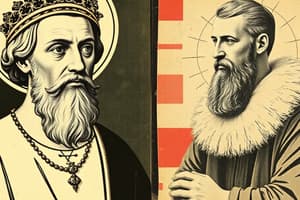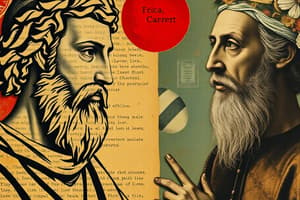Podcast
Questions and Answers
What does St. Augustine believe about the source of happiness?
What does St. Augustine believe about the source of happiness?
- Happiness can be found in one's achievements.
- Happiness is a result of fulfilling societal expectations.
- Happiness comes from individual success and autonomy.
- Happiness is achieved through divine love and connection to God. (correct)
How does St. Augustine's view of creation differ from Plato's?
How does St. Augustine's view of creation differ from Plato's?
- Augustine believes the world was created from existing materials.
- Plato believes in a creator who is dependent on the world.
- Plato asserts the world was created ex nihilo by a supreme being.
- Augustine teaches that God created the world out of nothing. (correct)
What did Augustine identify as the reason for human suffering?
What did Augustine identify as the reason for human suffering?
- The inability to achieve personal goals.
- Disordered love and misprioritization. (correct)
- Poor relationships with other people.
- A lack of physical resources.
What characterizes St. Thomas Aquinas's view of human nature?
What characterizes St. Thomas Aquinas's view of human nature?
According to Augustine, how can love be disordered?
According to Augustine, how can love be disordered?
What aspect of humanity does Aquinas focus on to explain understanding and life?
What aspect of humanity does Aquinas focus on to explain understanding and life?
How does St. Augustine describe God's nature in relation to humans?
How does St. Augustine describe God's nature in relation to humans?
What does Augustine believe humans must do to achieve happiness?
What does Augustine believe humans must do to achieve happiness?
What is the primary attribute that distinguishes humans as rational creatures?
What is the primary attribute that distinguishes humans as rational creatures?
According to Aquinas, what are the two ends or goals of human existence?
According to Aquinas, what are the two ends or goals of human existence?
What famous statement is attributed to Rene Descartes?
What famous statement is attributed to Rene Descartes?
What does Descartes use as a basis to doubt the existence of the world?
What does Descartes use as a basis to doubt the existence of the world?
What ultimately proves the existence of the Self, according to Descartes?
What ultimately proves the existence of the Self, according to Descartes?
What is the significance of the supernatural end in Aquinas's philosophy?
What is the significance of the supernatural end in Aquinas's philosophy?
What reasoning leads Descartes to doubt the existence of God?
What reasoning leads Descartes to doubt the existence of God?
Which of the following reflects Descartes' belief about the relationship between thought and existence?
Which of the following reflects Descartes' belief about the relationship between thought and existence?
What does Kant believe is necessary for knowledge to exist?
What does Kant believe is necessary for knowledge to exist?
According to Gilbert Ryle, what is mind-body dualism considered to be?
According to Gilbert Ryle, what is mind-body dualism considered to be?
How does Ryle define the self?
How does Ryle define the self?
What term does Ryle use to describe the logical error in discussing the self?
What term does Ryle use to describe the logical error in discussing the self?
What is the alternative phrase Ryle uses to emphasize self-existence compared to Descartes?
What is the alternative phrase Ryle uses to emphasize self-existence compared to Descartes?
What is the main criticism Ryle has against traditional views of the self?
What is the main criticism Ryle has against traditional views of the self?
What does Ryle claim about how we perceive the thoughts of others?
What does Ryle claim about how we perceive the thoughts of others?
What philosophical approach does Ryle advocate for regarding mental events?
What philosophical approach does Ryle advocate for regarding mental events?
Flashcards are hidden until you start studying
Study Notes
St. Augustine
- Augustine’s philosophy emphasizes spiritual grounding and a belief in the Supreme Being.
- The world was created by God out of nothing, unlike Plato’s belief that the Demiurge combined the Forms and the receptacle.
- Humans are incomplete and seek happiness, which they can only find through God.
- Happiness is achieved through love, but disordered love can lead to unhappiness and suffering.
St. Thomas Aquinas
- Aquinas Christianized Aristotle’s philosophy.
- The human person is a composite of body and soul.
- The soul is responsible for life, sensation, intellect, and will.
- The intellect is the greatest human ability, and contemplation of God is possible.
- Humans have two ends: natural (preserving life, procreation, truth-seeking) and supernatural (ultimate end in God).
Rene Descartes
- A rationalist who believed reason is the basis of knowledge and the self.
- Famous for the dictum "Cogito ergo sum" (I think, therefore I am), which was derived through methodic doubt.
- Descartes doubted the existence of the world and God because of the possibility of dreaming.
- The self exists because doubting requires thinking, and thinking requires a thinker.
- The self unifies sense experience and imposes categories of the mind.
Gilbert Ryle
- Gilbert Ryle was a 20th-century analytic philosopher who criticized Descartes' mind-body dualism.
- He argued that the self is not a separate entity but a way of referring to behavior.
- Proposed logical behaviorism, where mental events are translated into observable behavior.
- His motto, "I act, therefore I am," contrasts with Descartes' "I think, therefore I am."
Studying That Suits You
Use AI to generate personalized quizzes and flashcards to suit your learning preferences.




